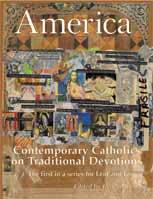My first memory of hearing the Angelus prayed was on a hillside in Mexico. We were in a country place not far from Puebla. American college students were wandering around to get a sense of the culture and to see the sights. I was not a Catholic then, and was only gradually learning how religion had been suppressed in Mexico.
But there, suddenly, was a picture on a hillside, almost like something from the Renaissance: the church, the bell tower, the people in a nearby field falling to their knees. One of them was a sister in full habit, a rare sight in Mexico then.
Our guide was a U.S. graduate student who knew Mexico well. They’re saying the Angelus, he explained.
Well, I thought I knew something about the Catholic faith, because I had been raised in New Orleans. Butsaying the Angelus? To me, it was brand new.
The Angelus is an ancient prayer in honor of the Incarnation. It is repeated three times a dayideally at the sound of a bell. There are three versicles, three Hail Marys and a concluding prayer.
Originally the Angelus was properly said kneeling, except on Saturdays and Sundays, when a standing posture was required. But in the 20th century the rules were relaxed somewhat. Still, the prayers need to be said at more or less the proper times: morning, noon and evening. The praying thus becomes part of the rhythm of the day.
The whole Angelus as commonly printed should be recited. But if you don’t have the text, don’t know the prayers by heart, or if you can’t read, you can say five Hail Marys instead.
And yes, there’s an indulgence given to those who say the Angelus. One hundred days for each recitation, with a plenary indulgence once a month, was attached to the prayer by Benedict XIII on Sept. 14, 1724. The conditions for reciting the prayer and receiving the indulgence were somewhat relaxed by Leo XIII on April 3, 1884.
But the sweetness of this devotion, I think, has more to do with the declaring than the receiving.
The Angel of the Lord declared unto Mary.
Angelus Domini nuntiavit Mariae.
In Scripture, the angel who declared unto Mary was the Archangel Gabriel. The angelic name, Gabriel, has proven a clue for scholars who want to trace the history of the Angelus. In an attempt to document the ringing of the Angelus in England and Europe in the 13th and 14th centuries, studies were made of inscriptions on church bells surviving from that era. In England, especially, a large number of church bells of that period bear Gabriel’s name. The bells have charming inscriptions: Dulcis instar mellis campana vocor Gabrielis (I am sweet as honey, and I am called Gabriel’s bell), Ecce Gabrielis sonat haec campana fidelis (Behold the bell of faithful Gabriel sounds), Missi de coelis nomen habeo Gabrielis (I bear the name of Gabriel sent from heaven) and Missus vero pie Gabriel fert laeta Mariae (Gabriel the messenger brings joyous tidings to holy Mary). And many more. The scholars concluded that these must have been Angelus bells, for though the archangel Michael was far and away the more popular patron in England, many more bells are inscribed for Gabriel.
It seems that the practice of ringing and reciting the Angelus grew out of an earlier practice of saying three Hail Marys at sunset, which became general throughout Europe in the first half of the 14th century. This prayer was indulgenced and recommended by Pope John XXII in 1318 and 1327. The recitation of Hail Marys at the Compline bell was recorded much earlier than this in Europe and the British Isles, apparently tied to a belief that this was the very hour when the Angel spoke to Mary. Some historians trace the Angelus to prayers said at the tolling of the curfew bell, first recorded in Normandy in 1061. The full Angelus, corresponding to our modern prayer, is first found in printed form in 1612. Variations occur in different locales; in Italy a De profundis was recited for the holy souls immediately after the evening Angelus. Another variation, also Italian, adds three Glorias to the Angelus in thanksgiving for Mary’s privileges.
Only last year a parish church near us in Alexandria, La., installed a new bell tower. And yes, among the many peals it plays in its electronic circuit, the Angelus sounds three times daily as it did in former times and places far away.
One recent book, Prayers at Midday (Liturgy Training Publications), a small collection of timeless prayers, recommends praying the Angelus with non-Catholics and presents a formula for doing so.
However we pray it, whenever we do, the wonder of the Incarnation becomes present to us as it did to our ancestors in faith.
Once, when I was making a weeklong retreat high in the Colorado mountains, at Nada Hermitage in Crestone, the Angelus bell happened to sound just when I was making a long-distance call. After I had placed the call, the Angelus bell began to ring.
When my husband answered, I said: Oh, my timing is off, they’re ringing the Angelus.
No, your timing is perfect, he responded.
And we said the Angelus together:
The Angel of the Lord declared unto Mary
And she conceived of the Holy Spirit.
Hail Mary, full of grace, the Lord is with thee....
What century is it? I found myself thinking. But then I decided the Incarnation belongs to all places and times.








